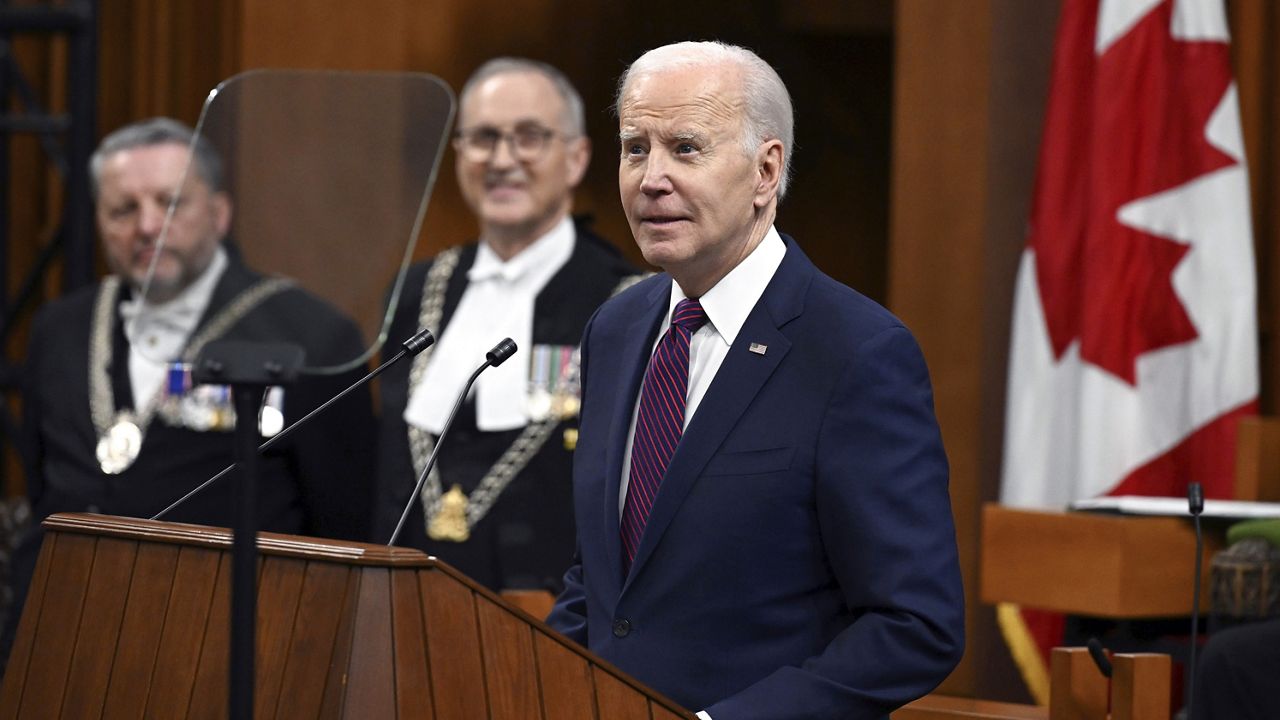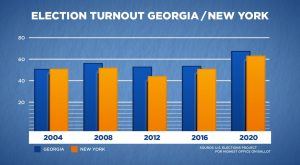President Joe Biden and Canadian Prime Minister Justin Trudeau on Friday praised their countries’ alliance and vowed to continue working closely together on issues such as climate change, migration and the security of the two nations.
What You Need To Know
- President Joe Biden and Canadian Prime Minister Justin Trudeau on Friday praised their countries’ alliance and vowed to continue working closely together on issues such as climate change, migration and the security of the two nations
- In his first visit to Canada as president, Biden held private talks with Trudeau in Ottawa before they both addressed Parliament
- The leaders also held a joint press conference before Trudeau and his wife, Sophie Grégoire Trudeau, hosted Biden and first lady Jill Biden for a gala dinner
- Biden and Trudeau announced a series of agreements Friday, including one aiming to stem the flow of asylum seekers at unofficial border crossings from the U.S. to Canada
In his first visit to Canada as president, Biden held private talks with Trudeau in Ottawa before they both addressed Parliament.
The two leaders also held a joint press conference, where the two leaders touched on several issues ranging from recent U.S. banking failures to Canada’s ban on TikTok.
“With all the challenges we face, we’re doubling down on our partnership and our friendship,” Trudeau said, touting a joint energy transformation task force for clean technology, a new system for building semiconductors, efforts to cut pollution and combat climate change and a new migration agreement.
“It has truly been an honor to be able to work with you for the benefit of Canadians and Americans, but also to continue to have a positive impact on the world in a very uncertain time,” he said to Biden. ” Like we have for many years, we will continue to work shoulder to shoulder as allies and friends to build a better future for Canadians and Americans alike. It is always a pleasure to stand beside you. It is always a pleasure to work with you.”
“I can’t think of a challenge we haven’t met together what we’ve sought to do it together,” Biden said to Trudeau.
“Mr. Prime Minister, Canada and the United States has always been partners in progress, and today we’re once again called to lead,” the president added. “I know that the United States can count on Canada to be our friend, doing the hard work, doing historic work, doing the work that matters and doing it together. I truly believe we’re gonna make some great contributions, and I am optimistic about the future. And that’s not hyperbole, I’m optimistic. I really am.”
“We’re gonna make a better future for the people of Canada, the American people, and a consequence for the whole hemisphere and around the world,” Biden said.
Trudeau and his wife, Sophie Grégoire Trudeau, were to host Biden and first lady Jill Biden for a gala dinner before their return to the United States.

President Joe Biden speaks to the Canadian Parliament, Friday, March 24, 2023, in Ottawa, Canada. (Kenny Holston/The New York Times via AP, Pool)
“Nothing is beyond our capacity,” Biden told Canadian lawmakers. “We can do anything. … We’re going to write the future together, I promise you.”
Trudeau called Biden “a true friend to Canada.”
“These are serious times when the consequences of a warming planet are intersecting with the aftermath of a global pandemic, when an unjustifiable war in Europe has shocked the conscience of the world and exposed the vulnerability of energy markets and supply chains, when families are facing the pressures of inflation and struggling with affordability, when citizens around the world feel anxious about their future and their kids’ futures,” Trudeau said.
“Mr. President, as it should be, our two nations stand united in this moment finding solutions, side by side,” the Canadian leader continued.
International relations: Ukraine, Haiti and beyond
The leaders’ wide-ranging talks touched on the 13-month-old war in Ukraine, military spending, shared concerns about China’s aggressiveness, and violence and political instability in Haiti.
Trudeau and Biden pledged their continued support for Ukraine in its war against Ukraine.
“Both of us are partners that Ukraine and the world can count on,” Trudeau said.
The two leaders touted their economic support for Kyiv and sanctions on Russia.
“After a terrifying spring, summer and fall and an exhausting winter, Ukraine still stands,” Trudeau said.
The leaders received a question at Friday’s press conference about whether or not they’re concerned about China’s expanded economic commitment to Russia. President Biden said that he disagreed with the premise of the query, downplaying the connection between the two countries while praising the strength of alliances like NATO, the G-7, ASEAN and AUKUS in the face of Russia’s invasion.
“We have significantly expanded our alliances,” Biden said. “I haven’t seen that happen with China and Russia or anybody else in the world.”
“Look, I don’t take China lightly,” Biden continued. “I don’t take Russia lightly, but I think we vastly exaggerated … I’ve been hearing now for the past three months about China is going to provide significant weapons to Russia. They’ve all been talking about that. They haven’t yet. Doesn’t mean they won’t, but they haven’t yet. And if anything’s happened, the West has coalesced significantly more.”

AP Photo
Regarding Haiti, Canada is being nudged by the U.S. and other allies to lead an international mission there to deal with the ongoing humanitarian and security crisis. Canada announced on Friday $72.7 million in new aid for Haiti.
When asked if he thinks Canada should do more to address the situation in Haiti, Biden called it “a very, very difficult circumstance.”
“The biggest thing we could do, and it’s going to take time, is to increase the prospect of the police departments in Haiti having the capacity to deal with the problems they’re faced,” Biden said. “And that is going to take a little bit of time.”
“For 30 years, Western countries involved have been involved in Haiti, to try to stabilize the country, to try to help ‘The Pearl of the Antilles,’ and the situation is atrocious,” Trudeau added, through a translator. “It’s affecting the security of the people of Haiti. We must to take action, and we must keep the Haitian people in the approach that we build for security, and that’s why the approach that we are working on with the U.S. involves strengthening the capacity of the Haitian National Police, bringing more peace and security and stability.”
“This won’t happen tomorrow,” he added. “It will, of course, be a long process, but we will be there to support the capacity of the police in Haiti.”
Haitian Prime Minister Ariel Henry and the country’s Council of Ministers sent an urgent appeal last October calling for “the immediate deployment of a specialized armed force, in sufficient quantity” to stop the crisis caused partly by the “criminal actions of armed gangs.” But more than five months later, no countries have stepped forward. Canada’s top military official has suggested the country doesn’t have the capacity.
As for China, Canadians Michael Kovrig and Michael Spavor, arrested there in 2018, were on hand for Biden’s Parliament speech.
The two were taken into custody shortly after Canada arrested Meng Wanzhou, the technology company Huawei’s chief financial officer and the daughter of the company’s founder, on a U.S. extradition request. The Canadians were held for more than 1,000 days in China before the Biden and Trudeau governments managed to win their release. Kovrig is a former diplomat, Spavor a businessman.
Meng reached an agreement with prosecutors that led to fraud charges against her being dismissed and allowed her to return to China.
“Under great pressure to undermine our commitment to our agreements and treaties and to the rule of law, we did not capitulate,” Trudeau said. “We did not abandon our values. We doubled down, and we rallied our allies against arbitrary detention. And through that, with your support and your leadership, Mr. President, the rule of law prevailed, and [they] came home.”
White House officials said Friday’s meetings was also expected to include discussion of defense spending, an issue that’s in the spotlight after the U.S. shot down a Chinese spy balloon that traversed part of Canada and the continental U.S. last month.
Canada has long faced calls to increase its defense spending to 2% of its gross domestic product, the agreed-upon target by NATO members. Ottawa spends about 1.2% now.
The Trudeau government announced plans Friday to accelerate billions more in defense spending. The money will go for infrastructure in the far north and a new radar system.
Economic collaboration: Migration, clean energy and NORAD
Biden and Trudeau announced a series of agreements Friday, including one aiming to stem the flow of asylum seekers at unofficial border crossings from the U.S. to Canada. Others included working together on establishing an integrated approach to accelerate the clean energy industry, harmonizing electric vehicle charging standards, strengthening critical mineral and semiconductor supply chairs, disrupting the production and distribution of synthetic opioids and bolstering the North American Aerospace Defense Command, or NORAD.
“Today, our destinies are intertwined and they’re inseparable, not because inevitability of geography but because it’s a choice — a choice we made again and again,” Biden said. “The United States chooses to link our future with Canada because we know that we’ll find no better partner.”
The migration accord eliminates a loophole under existing rules and will allow both countries to turn away asylum seekers at their borders. The migration agreement will take effect after midnight, in part to avoid a surge of refugee claimants trying to cross the border, officials said.
A 2002 agreement between the U.S. and Canada says asylum seekers must apply in the first country they arrive in. But the U.S.-Canada pact had only applied at official border crossings, creating an opening for migrants who travel through the U.S. to claim asylum in Canada, crossing illegally at Roxham Road, a half-hour taxi ride from the bus station in Plattsburgh, New York.
The quirk in the rules resulted in thousands of migrants annually crossing into Canada from the U.S. at a non-official checkpoint, enabling them to stay as they seek asylum instead of letting the process play out while staying in the U.S..
As part of the agreement, Canada is expected to announce that 15,000 migrants from the Western Hemisphere will be given official slots to apply to enter the country.
“I applaud Canada for stepping up with similar programs [to American ones], opening new legal pathways for 1,500 migrants to come to Canada from countries in the Western Hemisphere,” Biden said. “At the same time, the United States and Canada will work together to discourage unlawful border crossings and fully implement the updated Safe Third Country Agreement.”
They also addressed ways to combat the opioid epidemic, with Biden saying the two leaders are “doubling down on our work to disrupt synthetic drugs” and “working to get these killer drugs like fentanyl out of our communities.”
Trudeau on TikTok
Addressing the country’s recent ban on TikTok on government devices, Trudeau talked about security concerns with the popular social media app.
“We made a similar decision to the American government and others when we said that we do not feel that the security profile is a safe for government-issued phones,” Trudeau said. There are concerns around privacy and security, and that is why we have banned Tiktok from government-issued phones.”
Trudeau went on to discuss how the issue hits close to home for his family, when asked about what he would do as a parent of teenagers when it comes to TikTok.
“I’m obviously concerned with their privacy and their security, which is why I’m glad that on their phones that happen to be issued by the government they no longer access TikTok,” he said to laughter. “That was a big frustration for them. ‘Really, this applies to us to dad?’ Yes, I just did that.”
“I think as parents, we are understanding particularly of teenagers, just how much of our kids’ lives are lived online, and how much they are impacted,” Trudeau continued. “Not just by influenced the way their friends arem and peer pressure that all of us went through as teenagers, but a degree of misinformation, disinformation, and malicious activity that is allowed for by incredible advances in technology that we are benefiting from in so many different ways.”
“As governments, we have to make sure we’re doing what we can to keep people safe in the public square, making sure we’re pushing back against hate speech and incitations to violence online, and we’re carefully calibrating legislation to do that,” he added. “As a parent, I spend a lot of time talking to my kids about what’s online, and how they should try and go outside and play a little more sports and not get so wrapped up in their phones, and we’re going to continue to do that.”
“Our concerns around TikTok are around security and access to information that the Chinese government could have to government phones,” he concluded. “It’s just a personal side benefit that my kids can’t use TikTok anymore, and I recommend everyone to use my in my encouragement to try and do.”




